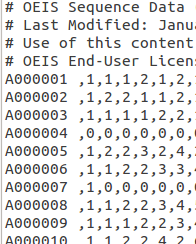To show that interpreted languages can be plenty fast when used well, I’m posting this example.
Take the On-line Encyclopedia of Integer Sequences database, which is a collection of integer sequences. That means lists of numbers. You can get a file from http://oeis.org/stripped.gz, which contains the first few numbers of each sequence. The file as at the time of writing file extracts to about 38MB.

I need to do lookups in this file for a program I’m writing, and that program is in PHP. I want to be able to look up sequences based on their A-number, like this:
$primes = oeis("A000040");
$fibonacci = oeis("A000045");
If we’re economical about it, then even this large-ish file can be parsed in fractions of a second. Here’s how we do it:
/* This code needs an extract of the OEIS database to operate.
I got a copy from [http://oeis.org/stripped.gz](http://oeis.org/stripped.gz)
Just extract that to this folder for lookups */
function oeis($number) {
/* Return an array of values based on a sequence's OEIS number */
$number = strtoupper($number);
$fp = fopen("stripped", "r");
while($ln = fgets($fp)) { /* Find this sequence and break the loop */
if(substr($ln, 0, strlen($number) + 1) == $number." ") {
$res = $ln;
break;
}
}
fclose($fp);
/* Exit if we haven't got anything */
if(!isset($res)) { return false; }
$rv = explode(" ", $ln); /* Split lines into left and right of space */
$ln = trim($rv[1]);
$ln = substr($ln, 1, strlen($ln)-2); /* Slices off extra commas on sides */
$rv = explode(",", $ln); /* Split by commas */
return $rv;
}
Note that we don’t use explode() until after we have found the line we need, and also note that file_get_contents() is not used at all. (As strings get larger they will bog you down in any language).